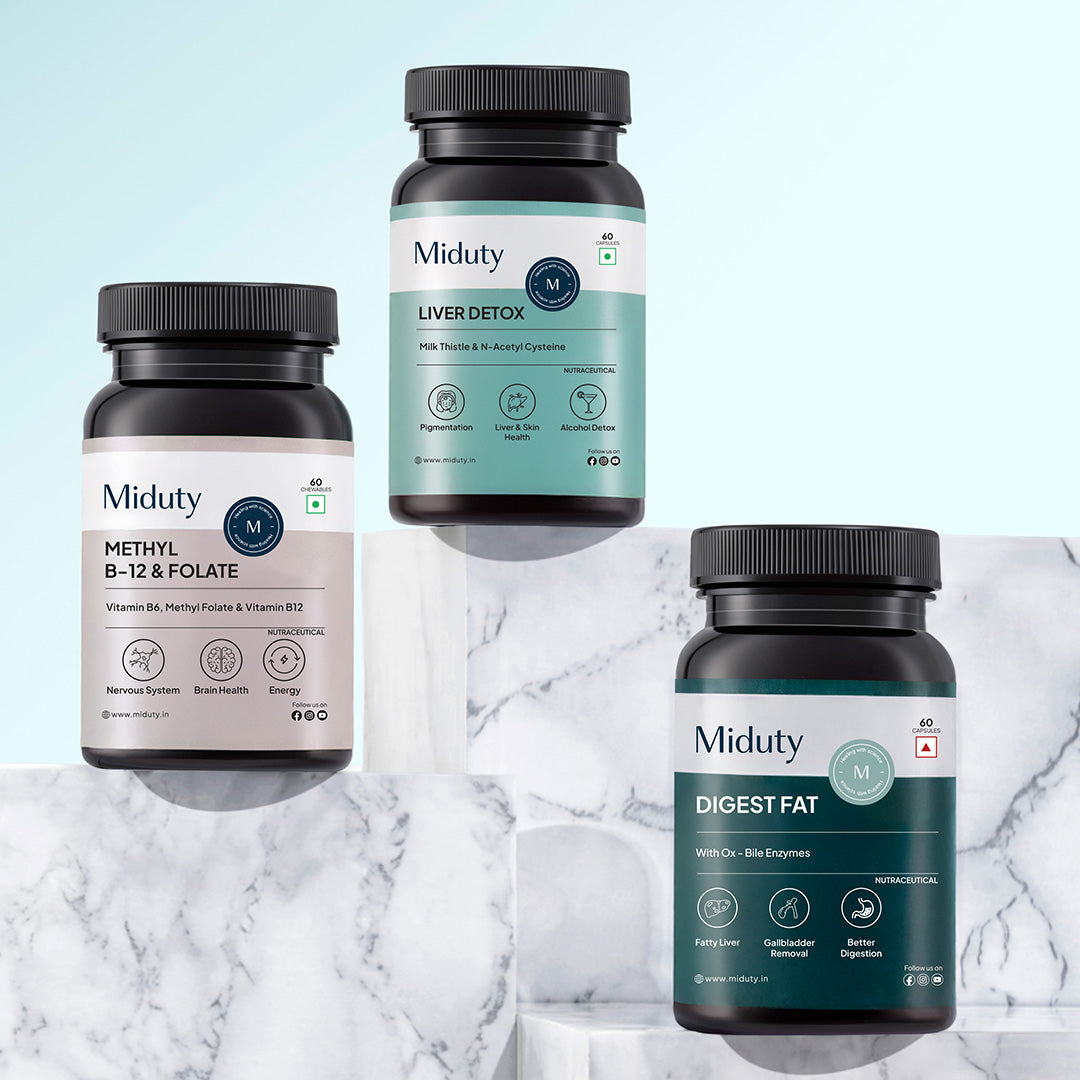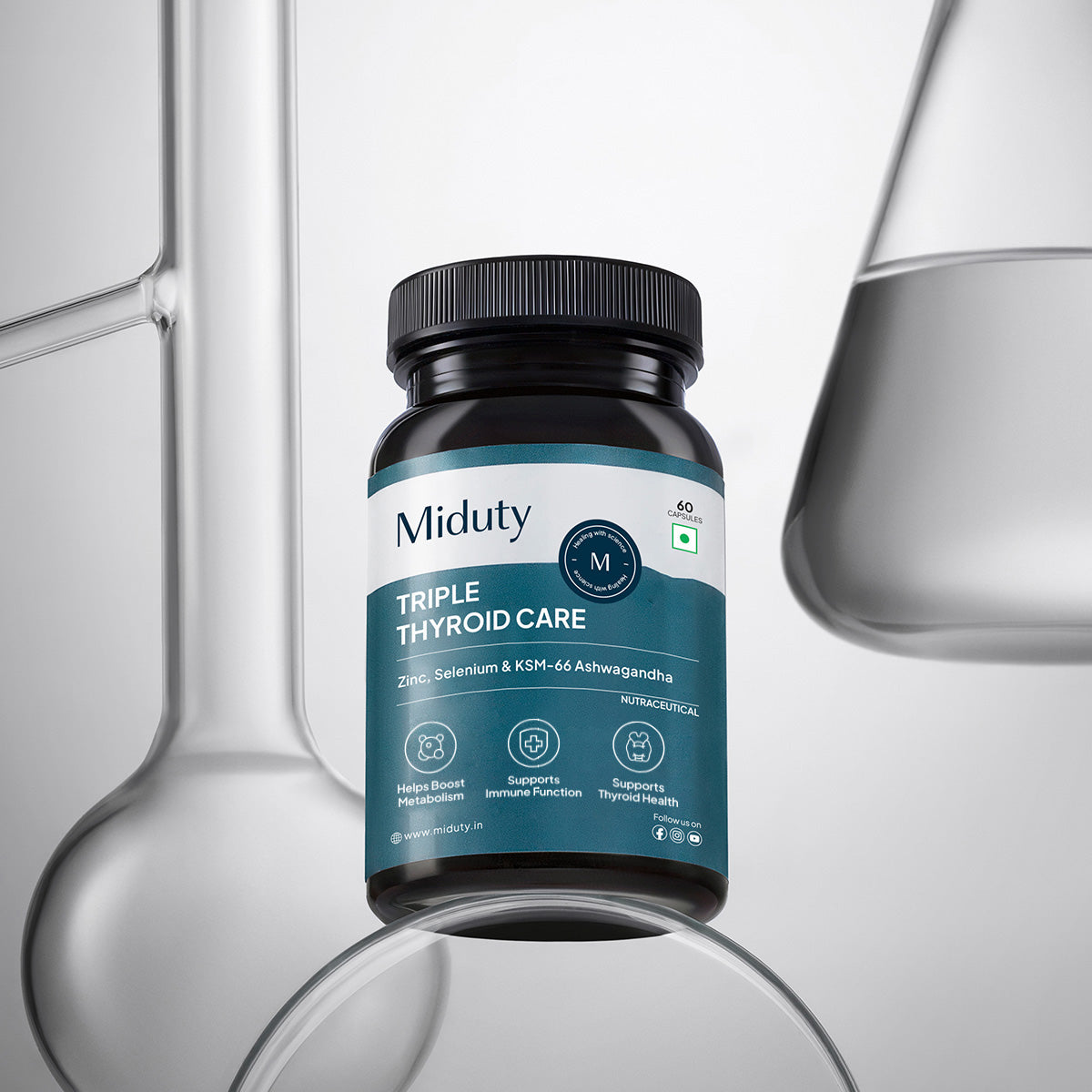
5 Effective Strategies To Improve Liver And Thyroid Function - The Liver-Thyroid Connection
Introduction
Did you know approximately 60% of the inactive thyroid hormone T4 is converted into the active T3 form in the liver.? That means a sluggish liver can directly impact your metabolism, energy, and hormonal balance.
Key Takeaways
1. Liver Blocking Thyroid Healing: Poor liver function hinders T4-to-T3 conversion, making it harder for your thyroid to recover even with meds or diet.
2. Toxins, Stress & Gut = Thyroid Chaos: Toxic load, chronic stress, and leaky gut burden the liver, disrupting hormone balance and worsening thyroid symptoms.
3. Estrogen Overload Starts in the Liver: When the liver fails to detox excess estrogen, it throws off thyroid hormones and impacts metabolism and mood.
4. Power Nutrients for Liver-Thyroid Axis: Zinc, selenium, NAC, and milk thistle detox the liver, lower inflammation, and support active thyroid hormone production.
5. Small Liver Habits, Big Hormone Impact: Leafy greens, hydration, and toxin-free living enhance liver health, improving energy, hormones, and thyroid function.
Tired, gaining weight, and still feeling off even when your thyroid tests are "normal"?What if the real problem isn't just your thyroid but your liver?
Surprising, right? Most people don't realize that your thyroid and liver work like a team and if one is struggling, the other suffers too. Your thyroid hormones may be perfectly fine, but if your liver isn't converting them properly, you'll still feel tired, foggy, and stuck.
In this blog, we're breaking down the shocking connection between your thyroid and liver and more importantly, what you can do about it to feel better, naturally.
How Does Liver-Thyroid Connection Affect Your Health?
1. Your Liver Converts Inactive T4 to Active T3
Your thyroid produces mostly T4 (thyroxine) a hormone that, on its own, isn't very effective. For your body to use it properly, T4 needs to be converted into T3 (triiodothyronine), the active form that enters your cells and drives metabolism, energy, and overall hormone balance.
Here's the kicker: about 60% of this T4-to-T3 conversion happens in the liver. If your liver is sluggish, inflamed, fatty, or overloaded with toxins, this conversion slows down, leaving you with low T3 levels even if your thyroid is technically working fine.
2. A Stressed Liver Can Increase Reverse T3 (rT3)
The liver doesn't just produce active T3, it also produces reverse T3, an inactive form that binds to T3 receptors and blocks them, preventing T3 from doing its job.
In states of chronic stress, inflammation, or liver dysfunction, your body converts more T4 into rT3 instead of T3, creating a hormonal bottleneck. This is often called "functional hypothyroidism," and it explains why you may have normal lab tests but still experience all the classic symptoms.
3. Estrogen Dominance Worsens Thyroid Function via the Liver
The liver is responsible for detoxifying excess hormones, including estrogen. If the liver is sluggish, estrogen builds up in the body, which can inhibit thyroid hormone from entering cells and disrupt the hypothalamic-pituitary-thyroid (HPT) axis.
In women especially those with PCOS, endometriosis, or who are on birth control, this thyroid-liver-estrogen triangle becomes a silent driver of fatigue, weight gain, and mood swings.
4. Nutrient Processing and Storage Happen in the Liver
The liver also plays a key role in storing and metabolizing nutrients that are vital for thyroid function, including:
- Zinc – Needed for T4 to T3 conversion
- Selenium – Helps prevent oxidative damage and supports thyroid enzymes
- Iron – Low iron = poor thyroid hormone production
- Vitamin A and D – Fat-soluble vitamins that aid hormone signaling
A poorly functioning liver can lead to deficiencies in these nutrients, even if your diet is healthy.
5. Medications, Alcohol, and Toxins Hurt Both Organs
Many people take medications like acetaminophen, antibiotics, or even statins without realizing the burden they place on the liver. Add to that alcohol, environmental toxins, processed foods, and endocrine disruptors from plastics and your liver ends up overwhelmed.
This toxic load diverts liver resources away from thyroid hormone conversion and detoxification, leaving your thyroid and metabolism sluggish.
How Do You Know If Your Liver Is Affecting Your Thyroid?
Here are common signs that your thyroid symptoms may be liver-related:
- Normal TSH but low T3 or high reverse T3
- Fatigue even after thyroid meds
- Trouble losing weight despite dieting
- PMS, heavy periods, or fibroids (signs of estrogen dominance)
- Bloating, indigestion, or acid reflux
- Skin issues like acne, rashes, or dullness
- Brain fog or mood swings
If several of these resonate with you, your liver may be the missing piece.
5 Liver-Supporting Strategies to Improve Thyroid Function
1. Eat a Liver-Loving Diet
Support your liver daily with foods that enhance detox pathways and reduce inflammation. Include:
-Leafy greens like arugula, spinach, and kale
- Cruciferous veggies (broccoli, cauliflower, cabbage)
- Beets and carrots (for bile flow)
- Lemon water (stimulates liver enzymes)
- Garlic and onions (rich in sulfur for detox)
- Healthy fats like olive oil and avocado
- Avoid processed foods, excess sugar, seed oils, and alcohol, all of which burden the liver.
2. Improve Gut Health
Remember, the gut-liver-thyroid axis is real. A leaky gut allows toxins and endotoxins (like LPS) to flow into the liver, increasing inflammation and slowing thyroid hormone conversion. Incorporate Probiotics such as sauerkraut, kefir, yogurt, or a supplement, Bone broth or collagen that heals gut lining and fiber foods as they feed good bacteria and binds to toxins.
3. Supplement Smartly
Certain nutrients directly support the thyroid-liver connection. You can consider:
- Selenium (100–200 mcg/day)
- Zinc (15–30 mg/day)
- N-Acetyl Cysteine (NAC) – boosts glutathione, your liver's master antioxidant
- Milk Thistle (Silymarin) – supports liver cell regeneration
- Magnesium – crucial for over 300 enzyme reactions including hormone metabolism
- Betaine HCL – improves stomach acid, aiding digestion and nutrient absorption
A supplement containing key nutrients like zinc, selenium, and iodine can significantly support thyroid hormone production and conversion. A dual-action supplement with NAC and Milk Thistle helps replenish glutathione and repair liver cells crucial for efficient T4 to T3 conversion.
4. Minimize Toxin Exposure
Reduce the toxic load on your liver with small but effective changes. Switch to non-toxic skincare and cleaning products. Avoid plastic containers for food and drinks. Filter your water and eat organic when possible. Avoid unnecessary medications (especially NSAIDs) unless prescribed.
5. Support Bile Flow and Estrogen Detox
Bile helps the liver flush out used hormones, toxins, and cholesterol. Without proper bile flow, you reabsorb estrogen and toxins back into circulation. To improve bile flow, include:
- Artichoke extract
- Dandelion root tea
- Taurine or choline-rich foods (eggs, fish, meat)
- Moderate exercise to improve circulation and liver function
Final Thoughts
The thyroid and liver connection is real, profound, and often ignored by conventional medicine. You could be doing everything "right" for your thyroid but if your liver isn't functioning optimally, your hormones won't either.
By supporting your liver with the right foods, supplements, and lifestyle changes, you can unlock better thyroid health, energy, and mental clarity. Remember: healing your thyroid isn't just about your thyroid. It's about healing the systems around it and your liver is at the heart of that system.
Frequently Asked Questions on Liver - Thyroid Connection
Q1 - Can liver cause thyroid problems?
Yes, the liver plays a key role in converting thyroid hormones from inactive to active forms. If the liver is sluggish or overloaded, it can disrupt this process and lead to thyroid symptoms like fatigue, weight gain, and brain fog.
Q2 - How to heal your thyroid by healing your liver?
To heal your thyroid by healing your liver, focus on a clean, nutrient-rich diet, reduce toxins, and support liver detox with ingredients like Milk Thistle, NAC, and leafy greens. A healthy liver improves T4-to-T3 conversion, balances hormones, and enhances thyroid function naturally.
Q3 - Is eating liver good for thyroid?
Yes, eating liver (chicken liver) can be beneficial for thyroid health as it's rich in key nutrients like vitamin A, iron, zinc, and selenium.
Q4 - Can thyroid affect your liver?
Yes, thyroid disorders can affect liver function. Low thyroid levels (hypothyroidism) can slow down liver metabolism and bile flow, leading to poor detoxification, while an overactive thyroid (hyperthyroidism) can increase liver enzyme levels and cause stress on the liver.
Q5 - What hormone affects the liver?
The liver is influenced by several hormones, especially thyroid hormones (T3 and T4), insulin, cortisol, and estrogen all of which regulate metabolism, detoxification, fat storage, and glucose processing in the liver.
References














1 comment
Great information 👌